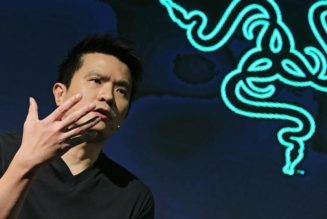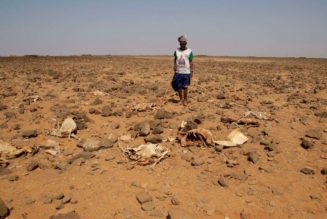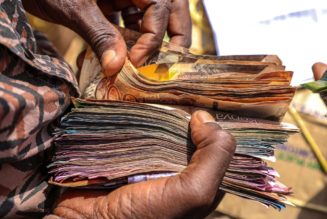Profiles
Julia Ojiambo: The renaissance woman
Friday February 09 2024

Prof Julia Ojiambo during the interview at Fairview Hotel Nairobi on February 6, 2024. PHOTO | DENNIS ONSONGO | NMG
She was the first African student to set foot at the Royal Technical College before it was renamed the University of Nairobi. The first Kenyan woman to enrol at Harvard University: packed her three children and a nanny and moved across the Atlantic in 1968! (This would be colloquially called a ‘boss move’ now by the cool internet kids).
She was the first woman to graduate with a PhD in Kenya – and the first PhD in the CHS Department of Community Health. First black African lecturer at the University of Nairobi. The first female MP from the Western province (Funyula constituency seat) elected to Parliament in 1974 General-Elections. (And the second woman elected to Parliament after Grace Onyango). First female to serve as a member of the Cabinet of Kenya. Then the plethora of President’s Awards: CBS (2017), MBS (2003). EBS (2015)…
Well, here she comes, Prof Julia Ojiambo crowned with her signature hairstyle, gingerly making her way through the luscious vegetation of Fairview Hotel, where she is most familiar and has a history with, her bird-like statue belying her compelling achievements and status that have shaped the landscape of Kenya’s nutrition, academia, politics, and gender rights. A true renaissance woman – if there ever was any.
Tell me everything you remember about your childhood.
I climbed trees to eat their fruits. I ate raw cassava, dug up sweet potatoes in barren gardens like squirrels, and pinched leaves of shrubs for vegetables. We bathed in the river and ran in the rain.
My mother was a pastor’s wife, so by extension, she also became mama kanisa [a church woman]. My father was everything: a reverend, a spiritual father, a community leader, a social worker, a walking dictionary for his people, and an elder. To the female congregants, my mother was the spiritual mother, a social worker, a caretaker, and a caregiver. As the church elder’s wife, she was a hostess, a nurse, a midwife, and the best lady at weddings and funerals. I grew up in that ecosystem.
What was the impact of growing up in a predominantly religious home?
It draws one to humanity. I grew up appreciating the good and happy moments of the villagers; we celebrated together. I was deeply involved in it. I was plunged into the darkness when my mom was tending to the sick, and if her closest friend or relative passed on, I became part and parcel of the team working to ensure she was laid to rest. I was deeply involved in church.
We [family] sat together in the evening and read the Bible before sleeping. We woke up to say the Lord’s prayer. We celebrated spiritual rites in the church. We washed the place, ironed linen, and laid the table where the sacramental items were placed. During weddings, we carried the flowers. We were nine children, but one passed on. I was the sixth born in a family of six girls and two boys.
What kind of a man was your dad?
A wonderful man, the best man I’ve ever known. He was a very loving father and a very strict teacher. And he was a gender-sensitive man! Imagine a father of six girls in a traditional setting, where, at that time, girls were not considered for anything other than dowry and taking care of the home. Dad took all of us to school and on equal terms. He treated us the same. We rarely noticed the gender differences. All of us grew up just to appreciate humanity.
What were your aspirations growing up in the village at that time?
I wanted to look like my mom, to do what she was doing. She was so grateful, tireless, full of energy, loving, and available to everybody. She seemed to solve every problem because we ran to her, and she was there, blessing all of us. I’d take out her wedding dress and shoes and wear them and imagine growing up like her, married to a good man like my dad.
Of course, we had significant challenges growing up, but who didn’t? My dad had a kindergarten playgroup around the homestead where children came to play. This turned into a primary school where we all went because dad was, besides a spiritual leader, also a teacher. He was a former army person (he was one of the career corps in the Second World War. (Kariakor), a trained disciplinarian. He stressed that you had to be a person who cares for others.
We were exposed to happiness, death, sorrow, and suffering because we saw and dealt with it in the community. We were all expected to be self-sufficient. Therefore, we joined our parents to develop our homestead, clean, and tend to the kids [goats’ young ones], chickens, and crops. So, we tilled the land, sowed seeds, shelled and ground the farm produce, and looked after the chicks until they turned into stew. (Chuckles) This was home science in the making.
Then you started going to school…
I went to the junior primary some four kilometres away in Samia and then intermediate school in Butere, which was 70 kilometres away. We’d walked from Samia to Butere because there was only one bus between Sio-Port and Kisumu, which would take three days to fill or not come at all. So, we’d walk with a little box on our heads carrying dried maise, obambla…do you know obambla?
Of course. Dried…smoked fish.
Yes, because that’s what we were going to eat at school. If your mom didn’t pack these dried delicacies like obambla and omena for you, you had to make do with ugali and green leaves. This was in 1947. Was your mother born?
No. Not yet. Neither was my dad.
So you can imagine. So, in 1950, I sat the tough KAPE (Kenya African Preliminary Exam) and passed very well. But then there was nowhere to go because the only careers available for women back then were nursing and teaching. It didn’t help that there weren’t many nursing or teacher training schools.
So, for a while, I became a social worker in villages where I’d teach women about child welfare, cleaning, cooking, baking and other things we picked up at school. I also taught adults how to write and read the Bible.
In Butere, I was drafted to translate the Bible from English to Luhya.
In the meantime, Alliance Girls was formed after church interventions, and the top performers of the KAPE exams in each province were invited to join. That’s how I joined Alliance Girls, first known as African Girls High School, and then things sort of unravelled from there.
As a woman of firsts, was there pressure that came with that? Did you feel you had a great responsibility, not only to yourself but to others?
But what else did I have? I had no fallback position. When Edmund Hillary set out to climb Mount Everest, would he have wanted to go back? I didn’t have anyone to hold my hand or push me. The environment itself did not offer support mechanisms. Instinctively, I had to find a way to move forward.
For instance, when I wanted to go for postgraduate education in the US, I had to apply to all 52 states to find one that would take me in. I did not know it would happen, but when I received many offers, I had to choose the best package. Harvard awarded me a full scholarship.
After admission, I also qualified for an award of a UN- WHO Fellowship award. It was not easy to qualify for it, but like many others around the globe, I applied for it. It covered my travel ticket, tuition, accommodation, health insurance, and everything.
I was a mother with children. I told them I wasn’t leaving them behind, so I needed an apartment where they would stay with a nanny I was bringing from home. But Harvard is no joke; they give me all that, but I hardly had the time to sleep in the apartment. The studies were highly demanding. They didn’t care that I was an African mother. I was a student.
How was being a mother of three and a wife with all these balls in the air in the 1950s?
I had to choose to do what I could. Being a mother prepared me to work and gave me the comfort I needed spiritually, mentally and physically.
What do you mean?
I thank God for the children I had. I saw them grow, and I was happy that not only I but my family was achieving as well. One thing that my mother taught me was to always plan your day. You have to prepare for every moment and plan to achieve. Don’t plan and put in blocks that will hinder your strategy.
So, in my case, as I planned to go to Harvard, I knew the demands that would come with that and decided to get help by bringing my housekeeper to help take care of my children and home as I studied.
I also enrolled her in college in Canada, where she trained in hotel management. When she returned in 1972, she was a full housekeeper at this hotel, the first African housekeeper. She stayed there until she passed on last year.

Professor Julia Ojiambo at a past event. FILE PHOTO | SILA KIPLAGAT | NMG
Beatrice was a Maragoli girl, a wonderful woman. She was like a mother, nurse, banker, and spiritual leader to us. She kept all our family accounts. When I was in Harvard, she would receive the money when my stipend came, give me my daily fare to school and back, and at the end of the month, give an account for how the money was spent to the last penny. She helped me focus on education. So that’s why I said that you need to plan. I planned because when I left here, my son was only three weeks old and still breastfeeding.
Fascinating. Where was your husband, Professor Ojiambo, during all these? Did you discuss these moves, and what were his sentiments?
Fortunately, we were all interested in educational advancement. When we started, he won a Commonwealth scholarship to Edinburgh for his postgraduate medicine degree. Around the same time, I won a United Nations fellowship to attend London University for my undergraduate degree.
After graduating, we returned to work as we prepared ourselves for postgraduate studies. He was practising and researching, and I was teaching and also researching. Then he won another fellowship to go to McGill in Canada for postdoctoral medical, and I went to Harvard. So, we were out at the same time on the same continent but in different universities. We used to commute on the weekends. Well, he did most of the commuting from wherever he was to support me with the children.
In London, I didn’t have a house. I had many friends from all over the world who also were students. They offered to babysit. In America, I was lucky I had a loan from the Education ministry, so we could share whatever stipend we got between my husband and myself to support ourselves, the children and our housekeeper.
What are some of the habits that have helped you succeed?
Your disposition in life is fundamental. Try as much as possible to stay positive. It’s important that one settles one’s self-will. Being quiet occasionally with your God teaches you to take stock of who you are and where you want to go.
Don’t always be the one who must be in front; consider that others are equally gifted, like yourself. And you have to move with them.
Keep a good circle of friends; you’ll need them in distress. I’ve gone through difficult stages; I lost my parents when I was a little girl. I lost my husband, my grandchild, and my son. But these things are part of the storms that come.
When you look at the world now, what surprises you?
Technological advancement has grown beyond what I expected. When I went to the Royal Technical College, now the University of Nairobi, as the first African student to set foot on campus, a keyboard was introduced in the Department of Engineering. I remember the size was massive. It’s an astronomical advancement during a lifetime. It took me three months to navigate my admission for my postgraduate work in North America because a letter would take three weeks to get there and three weeks to return. Education was very competitive and tough because we didn’t have the aids people have now; like Google, you had your brain.
Lastly, you’ve always maintained that hairstyle; all the pictures I looked at, you sport it.
Do you not like it?[Laughs]
I like it. It’s natural.
That’s who I am. And I wear it because God has not changed me to something else. He has maintained me as a human being. And that’s Julia. So, now when you see me, you recognise me as Julia. Isn’t your beard your signature? Are you going to change it one day?









